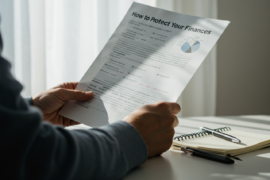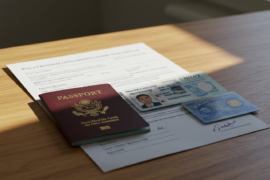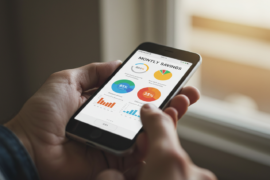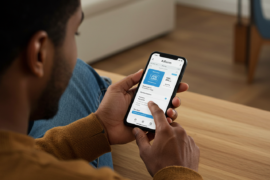This article may contain references to products or services from one or more of our advertisers or partners. We may receive compensation when you click on links to those products or services. Nonetheless, our opinions are our own.
Navigating relationships can be emotionally complex, especially when what appears to be love begins to feel uncertain or draining. Sometimes, patterns of control, manipulation, or emotional neglect are mistaken for everyday relationship struggles. If you’ve started questioning whether your partnership is genuinely supportive, examining the dynamics at play is essential.
We’ll outline 12 clear signs that may suggest you’re in a toxic relationship. Recognizing these patterns is the first step toward protecting your emotional well-being and regaining your sense of self. By understanding how toxicity manifests, you can begin the process of healing, set healthier boundaries, and make decisions rooted in self-respect and personal growth.
Your emotional health matters—and learning to identify harmful behaviors is key to creating more balanced, respectful, and fulfilling connections.
- Identifying Emotional Manipulation in Your Relationship
- Recognizing Patterns of Controlling Behavior
- Understanding How Your Self-Esteem Is Affected
- The Importance of Setting Boundaries and Leading with Assertiveness
- Taking Action: Steps to Break Free from Toxic Dynamics
- Finding Support and Resources for Healing and Growth
-
Frequently Asked Questions
- What are some common signs that indicate I might be in a toxic relationship?
- How can I tell if my partner is emotionally abusive?
- Is feeling drained after interactions with my partner a sign of toxicity?
- What role does communication play in a toxic relationship?
- Can jealousy be a sign of a toxic relationship?
- Are there signs related to personal isolation in a toxic relationship?
- What should I look for regarding trust in my relationship?
- How can I identify if I’m experiencing manipulation?
- Why is it important to recognize a lack of boundaries in my relationship?
- What role does accountability play in assessing relationship toxicity?
- How can I tell if my partner is consistently dismissive of my feelings?
- Final Thoughts
- Recommended Reads
Identifying Emotional Manipulation in Your Relationship
In any relationship, it’s crucial to recognize when emotions are being used to manipulate rather than communicate effectively. Emotional manipulation can leave you feeling confused and drained. Look for these key indicators:
-
Gaslighting: You are frequently questioned about your feelings or perceptions, which leads you to doubt your reality.
-
Shame and Guilt: Your partner uses guilt to influence your decisions, making you feel selfish for prioritizing your needs.
-
Withholding Affection: Love and affection are conditional on your compliance, leading to a constant sense of insecurity.
-
Playing the Victim: Your partner often portrays themselves as the victim to manipulate your emotions and elicit sympathy.
If these behaviors occur frequently, it may be worth taking a step back to assess their impact on your well-being. Consider keeping a journal to track incidents that make you feel uneasy. This can help you distinguish between healthy relationship dynamics and toxic patterns.
Recognizing Patterns of Controlling Behavior
In a toxic relationship, it’s essential to be aware of controlling behaviors that may undermine your autonomy and self-worth. You might start noticing patterns where your partner seeks to dictate various aspects of your life. This can manifest in multiple ways, such as:
-
Monitoring Your Movements: They insist on always knowing your whereabouts, leaving you feeling like a child under scrutiny.
-
Isolating You: A controlling partner might try to limit your interactions with friends and family, making you feel alone and unsupported.
-
Dictating Personal Choices: From what you wear to how you spend your free time, they may try to control aspects of your life that should be your personal decisions.
-
Excessive Criticism: Constantly pointing out your flaws can diminish your self-esteem and increase your reliance on their approval.
-
Using Love as Leverage: Withholding affection as a bargaining chip can leave you feeling insecure and confused about your worth in the relationship.
Be vigilant for these behaviors, as they may initially appear subtle and intensify. Recognizing them is the first step toward understanding the dynamics of your relationship and advocating for your well-being.
Understanding How Your Self-Esteem Is Affected
Your self-esteem can suffer significantly in a toxic relationship, often leading to doubts about your worth and capabilities. You might find yourself constantly seeking validation from your partner or feeling inadequate due to their criticisms. This erosion of self-worth can manifest in various ways, such as:
-
Feeling Unworthy: No matter what you achieve, you may feel it’s never enough in their eyes.
-
Increased Self-Doubt: You might second-guess your decisions and opinions, leading to insecurity.
-
Isolation: You may distance yourself from friends and family, believing your partner is your only source of support.
-
External Validation: You become overly reliant on your partner’s approval for your self-worth.
-
Fear of Rejection: You feel anxious about upsetting your partner, fearing that disagreement could lead to conflict.
Recognizing these patterns is crucial for rebuilding your self-esteem. Consider creating a simple self-assessment table to track your feelings and experiences:
| Feeling | Frequency |
|---|---|
| Inadequate | Daily |
| Validated | Rarely |
| Confident | Occasionally |
By maintaining awareness of these negative feelings and their triggers, you can take proactive steps to reclaim your self-esteem, whether through seeking support, setting boundaries, or engaging in activities that reinforce your sense of worth.
The Importance of Setting Boundaries and Leading with Assertiveness
Boundaries are essential for maintaining mental and emotional well-being, especially in a tumultuous relationship. When you learn to assert yourself, you communicate your needs clearly and show others how you expect to be treated. This act of self-advocacy strengthens your self-esteem and is a protective barrier against toxic behaviors. Consider these key aspects of assertiveness:
-
Clarity of Needs: Articulating what you require helps others understand your limits.
-
Respect for Self and Others: Setting boundaries teaches others to respect you while encouraging mutual understanding.
-
Improved Communication: Being assertive promotes open dialogue about needs and discomforts.
To put this into practice, try creating a personal boundary checklist:
| Boundary Type | Example Statement |
|---|---|
| Emotional | “I need some time alone to recharge; please respect that.” |
| Physical | “I’m not comfortable with you touching my things without asking.” |
| Time | “I can’t talk right now; let’s chat later when I’m free.” |
By implementing these strategies, you empower yourself to move away from toxic dynamics and nurture healthier relationships. Assertiveness is not about being aggressive; it’s about standing firm in your self-worth and creating a space where your voice is valued.
Taking Action: Steps to Break Free from Toxic Dynamics
Breaking free from toxic dynamics is not just about recognizing the signs; it’s also about taking actionable steps toward healing and empowerment. Start by establishing clear boundaries. Define what behavior you will not tolerate and communicate these limits firmly. This process may initially feel uncomfortable, but remember, you deserve respect and kindness.
Surround yourself with supportive individuals who uplift you—friends, family, or professional counselors can provide the encouragement you need. Building a strong support network helps reinforce your confidence as you navigate challenging emotional waters.
Consider journaling to reflect on your feelings and experiences. This can be a powerful tool for processing your emotions. Set small, achievable goals—taking a day for self-care, exploring a new hobby, or seeking therapy. Here’s a simple table to help guide your process:
| Action Step | Purpose |
|---|---|
| Set Boundaries | Protect your emotional space |
| Seek Support | Gain encouragement and perspective |
| Journaling | Process thoughts and emotions |
| Self-Care | Rejuvenate and refocus |
By taking these steps, you can reclaim your autonomy and foster healthier relationships. It’s essential to prioritize your well-being and remember that change takes time, but each small step is progress toward a brighter, more fulfilling future.
Finding Support and Resources for Healing and Growth
Recognizing the signs of a toxic relationship is the first step toward reclaiming your life and well-being. Once you’ve identified the need for support, knowing that help is available is essential. Reach out to trusted friends or family members who can offer a listening ear and a safe space to share your feelings.
Connecting with others who have gone through similar experiences can also be incredibly validating. Look for support groups online or in your community; these can provide a sense of belonging and understanding that is often vital in your healing journey.
In addition to personal support, professional resources can be transformative. Therapists or counselors specializing in relationship issues can offer tools and strategies tailored to your situation. Explore the following options:
-
Individual Therapy: A safe environment to explore your thoughts and emotions.
-
Group Therapy: Sharing your experiences with others who understand can foster solidarity.
-
Online Resources: Websites and apps offering articles, podcasts, and exercises focused on healing from toxic relationships.
Don’t hesitate to seek out these resources—recognizing the need for support is already a courageous step toward your growth.
Frequently Asked Questions
What are some common signs that indicate I might be in a toxic relationship?
Constant feelings of anxiety, fear, or unease around your partner can signify toxicity. If you find yourself avoiding conflict at all costs, it’s a warning sign. Other signs include a lack of support, excessive criticism, manipulation, or a feeling of being controlled.
How can I tell if my partner is emotionally abusive?
Emotional abuse can manifest as belittling, gaslighting, or making you feel guilty for your feelings. If your partner frequently dismisses your emotions or undermines your self-worth, these are clear signs of emotional abuse.
Is feeling drained after interactions with my partner a sign of toxicity?
Absolutely. If interactions with your partner frequently leave you feeling emotionally or physically drained, this is a strong indicator of a toxic dynamic. Healthy relationships should energize and uplift you rather than deplete you.
What role does communication play in a toxic relationship?
Communication in toxic relationships is often poor or hostile. You may notice that discussions escalate into arguments, or you may feel unheard or invalidated. Healthy communication should involve active listening and mutual respect, which is usually lacking in toxic situations.
Can jealousy be a sign of a toxic relationship?
Yes, intense jealousy can indicate toxicity. While it’s normal to feel a little insecure sometimes, extreme jealousy can lead to controlling behavior and mistrust, significantly damaging the relationship.
This is a significant red flag if your partner tries to isolate you from friends or family. A toxic partner may discourage you from socializing or undermine your relationships with others to gain control.
What should I look for regarding trust in my relationship?
Trust should be a foundational element of any relationship. In a toxic dynamic, you may question your partner’s honesty or feel mistrustful without cause. It may indicate deeper issues if you feel compelled to monitor their actions.
How can I identify if I’m experiencing manipulation?
Manipulation may present itself as guilt-tripping, making you feel responsible for your partner’s emotions, or distorting the truth to achieve a desired outcome. If you often find yourself questioning your reality or emotions, you may be experiencing manipulation.
Why is it important to recognize a lack of boundaries in my relationship?
Healthy relationships require clear boundaries. If your partner consistently disrespects your personal space, autonomy, or emotional needs, it’s a sign that the relationship may be toxic. Boundaries are essential for mutual respect and understanding.
What role does accountability play in assessing relationship toxicity?
In a healthy relationship, both partners take responsibility for their actions and impact on each other. If one partner consistently blames the other for problems or refuses to acknowledge their role in conflicts, it reflects a toxic dynamic.
How can I tell if my partner is consistently dismissive of my feelings?
If your partner often trivializes your emotions, responds with indifference, or makes you feel silly for expressing your feelings, they may be dismissive. This undermines your emotional safety and is a clear sign of toxicity in the relationship.
Final Thoughts
Recognizing you’re in a toxic relationship is incredibly brave. Healing is possible—and you don’t have to do it alone. Reclaiming your emotional well-being starts with awareness, boundaries, and support, whether you stay or leave.

Reviewed and edited by Albert Fang.
See a typo or want to suggest an edit/revision to the content? Use the comment form below for feedback.
At FangWallet, we value editorial integrity and open collaboration in curating quality content for readers to enjoy. Much appreciated for the assist.
Did you like our article and find it insightful? We encourage sharing the article link with family and friends to benefit as well - better yet, sharing on social media. Thank you for the support! 🍉
Article Title: 12 Signs You’re in a Toxic Relationship
https://fangwallet.com/2025/03/29/12-signs-youre-in-a-toxic-relationship/The FangWallet Promise
FangWallet is an editorially independent resource - founded on breaking down challenging financial concepts for anyone to understand since 2014. While we adhere to editorial integrity, note that this post may contain references to products from our partners.
The FangWallet promise is always to have your best interest in mind and be transparent and honest about the financial picture.
Become an Insider
Editorial Disclaimer: The editorial content on this page is not provided by any of the companies mentioned. The opinions expressed here are the author's alone.
The content of this website is for informational purposes only and does not represent investment advice, or an offer or solicitation to buy or sell any security, investment, or product. Investors are encouraged to do their own due diligence, and, if necessary, consult professional advising before making any investment decisions. Investing involves a high degree of risk, and financial losses may occur including the potential loss of principal.
Source Citation References:
+ Inspo
There are no additional citations or references to note for this article at this time.











































